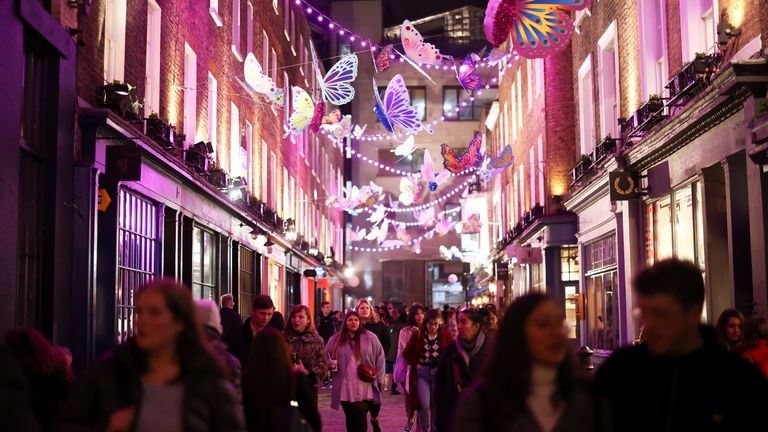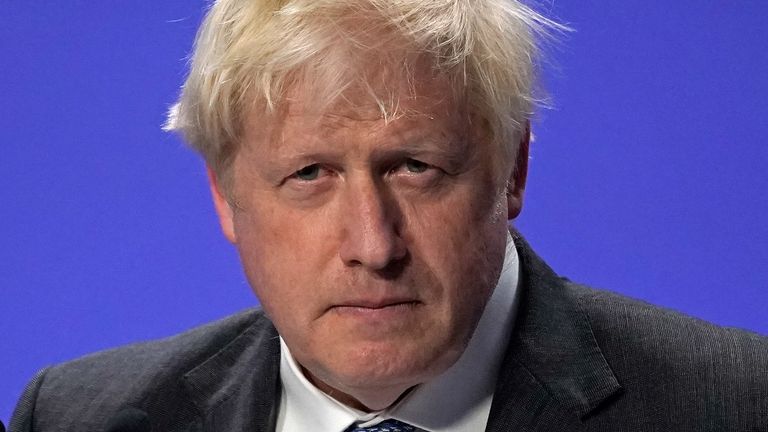The possible introduction of further coronavirus restrictions this winter is in “our hands”, Oliver Dowden has said.
The Conservative Party co-chairman told Kay Burley that there are “no plans or anything else to stop Christmas happening” this year as the situation is different compared to 2020 because of the success of the vaccination rollout.
But Mr Dowden warned that people must take up the offer of a booster jab when invited for one in order to keep the chances of further rules being introduced as low as possible.
JCVI to make boosters announcement; reports of UK ‘exit strategy’ – COVID latest
He also refused to directly answer a question on whether travel restrictions could be brought back.
Speaking to Sky News on Monday morning, Mr Dowden said “it is in our hands” whether further restrictions are introduced this winter, adding: “If you get the booster when the call comes that is the biggest wall of defence that we have against COVID.”
He added: “I am confident that if we stick the course, people take the boosters when they are asked to do so, that vaccine wall will hold up and we will be able to have a decent Christmas this year.”
The Conservative Party co-chairman continued: “The way we avoid a challenging position is to take the booster – so I can assure you that there are no plans or anything else to stop Christmas happening.
“The huge difference this time is the vaccine and the huge impact of the vaccine – and the way that we keep that vaccine topped up, the way that we keep that wall of defence protected is get your booster when you get the call up.”
The Joint Committee on Vaccination and Immunisation (JCVI) will be making a further statement on jabs later on Monday, he added.
Mr Dowden’s comments come after experts said this weekend that they don’t believe the UK will see a “catastrophic winter wave” that will require restrictions over Christmas.
Professor Neil Ferguson, a member of SAGE, said on Saturday that the UK was in “quite a different situation” to some European countries reintroducing measures as their cases increase.
Austria, for example, has announced a 10-day lockdown for anyone who is not double-jabbed and there were arrests and protests in the Netherlands over a new partial lockdown.
UK figures on Sunday showed another 36,517 daily cases and 63 COVID-related deaths. That compares with 30,305 cases and 62 deaths this time last week.
The latest seven-day average for cases is 37,488 – a fall from a month before when it was nearly 40,000.
Average deaths stand at 156, compared with 117 a month before.
Meanwhile, another 448,670 people had a booster vaccination on Saturday, taking the total who’ve received a third jab to 12,613,256.
Speaking to Sky News on Monday, Mr Dowden did, however, caution that controls could be needed if the situation changes dramatically – such as the emergence of a new variant of coronavirus.
“We haven’t ruled it out. If the situation change dramatically we would have to review that again,” he told Kay Burley.
On Saturday, Prime Minister Boris Johnson warned the rise in COVID cases in Europe could be seen in the UK if people do not get their booster jabs fast enough.
The prime minister said: “I’m seeing the storm clouds gathering over parts of the European continent and I’ve got to be absolutely frank with people, we’ve been here before and we remember what happened when a wave starts rolling in.
“The UK has built up a huge amount of protection thanks to the vaccine rollout and people’s amazing willingness to come forward and get jabbed. What I’m saying today is the urgency of getting that booster jab is more evident than ever.”
He added: “What I’m also saying is if we don’t do it fast enough we can see the potential risks to the state of the pandemic in what’s happening in other parts of Europe.”
The latest Office for National Statistics (ONS) data, released on Saturday, showed there was a decrease in COVID infections across most regions in England in the week up to 6 November but there are early signs of an increase in the East Midlands.
Hospital admissions and deaths have also been lower in the current third wave across England than in the corresponding week in the second wave this February, the latest data also shows.
The PM said the numbers were “encouraging” but added that it was not clear if the drift downwards will continue.



